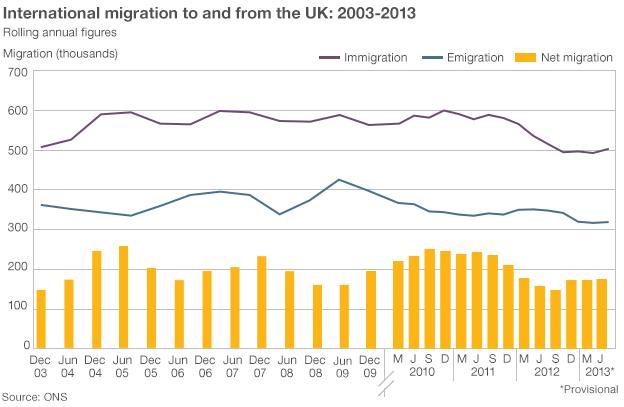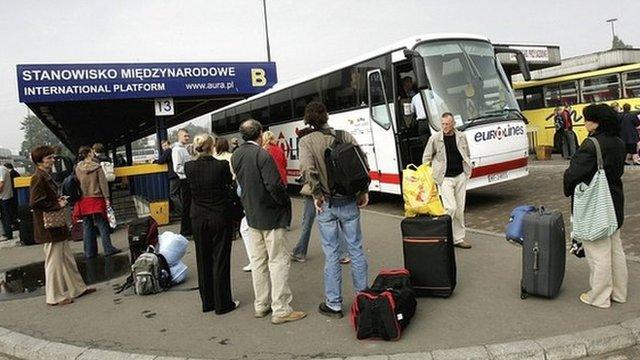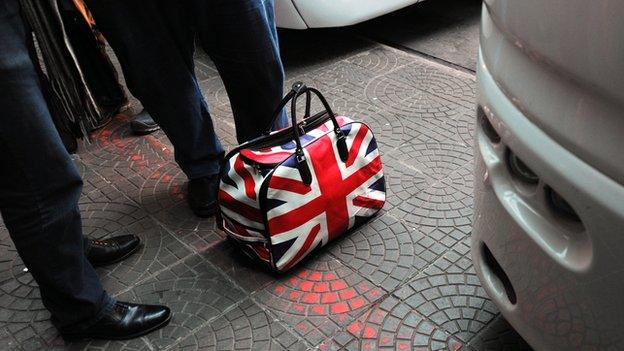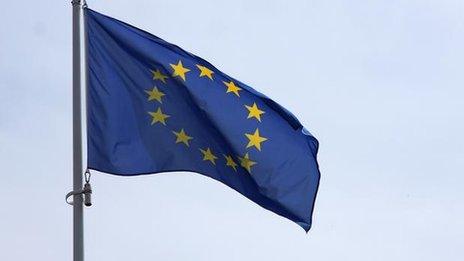Labour hints at shift on EU free movement policy
- Published
Shadow Business Secretary Chuka Umunna made the remarks on Question Time
Shadow business secretary Chuka Umunna has suggested Labour may be interested in restricting free movement within the European Union for workers who do not have the firm offer of a job.
Speaking on BBC One's Question Time, Mr Umunna did not elaborate on the idea, but said he was already discussing it with "partners" from other countries.
It comes after restrictions on Bulgarians and Romanians working in the UK were eased on 1 January.
The move has seen a debate on controls.
Labour said it had been considering the case for new restrictions for some time, first raised by shadow home secretary Yvette Cooper in a speech in March.
Meanwhile, a senior EU official accused British ministers of stoking fears about immigration.
Viviane Reding, vice-president of the European Commission, said the figures showed it was a "myth" the UK was being invaded by foreigners
Viviane Reding, vice-president of the European Commission, said the figures showed it was a "myth" that the UK was being invaded by foreigners, and suggested the rhetoric was designed to draw attention away from the real problems the UK was facing.
'More work'
When asked by Question Time presenter David Dimbleby what Labour had to say to those who wanted to see immigration cut, Mr Umunna said: "I think on low-skill immigration we believe there was too much of it from the European Union.
"I think there is one important thing about the European Union, the founders of the European Union had in mind free movement of workers not free movement of jobseekers. And undoubtedly we do have to work with our European partners to deal with that."
He said he had "met with a number of them this week" and "they are very open to that [idea] if we constructively engage with them, instead of saying, 'Hey, do what we want otherwise we are going to walk off.'"
.gif)
He went on: "What people intended when they built the EU in the first instance was that people who either had a job or had the skills to get a job would move around the European Union.
"The problem that we've had at the moment is that we've had, during our time in office - and this is where we did make a mistake - you had high skilled people coming from other countries to do low skilled jobs here."
Mr Umunna said immigration had been good for the country but people wanted the system to be "properly managed".

Controls in place since 2007 expired on 1 January giving Bulgarian and Romanian citizens the same rights to work in the UK as other EU citizens.
The UK has not released forecasts on migrant numbers - but the government has said curbs on access to benefits will ensure new arrivals contribute to the economy.
Speaking in December, David Cameron said a future Conservative government would argue for a review of existing laws enabling citizens of EU countries to live and work wherever they choose within the union.
Yvette Cooper has also previously suggested action was needed, saying "giving people the right to work in other countries is not about people travelling and getting support from other countries if they don't plan to contribute".
'Invasion myth'
Meanwhile, Ms Reding has said claims that EU migrants were coming to the UK "and stealing the jobs, stealing the social security and health money" were untrue.
Migrants put more into the UK economy than they got out, she said during a webchat on European citizenship.
"Those who take out of the social security are more the nationals - much more the nationals - than the European citizens who take advantage of the free movement.
"So it is just a myth to speak about an invasion."
Conservative MP Mark Reckless said he was surprised by the comments.
"I think the measures taken by the government have been quite moderate and actually I think it is some of these European politicians - Ms Reding, her colleague Mr [Laszlo] Andor (European employment commissioner), [and] the Polish prime minister and foreign minister, who seem to have been stoking this issue up," he told BBC Radio 4's Today programme.
A UK government spokesman said: "Hard-working people expect and deserve a benefits system that is fair to British citizens and migrants who come here to work but is robust and tough on those who abuse the system and flout the law."
- Published7 January 2014

- Published7 January 2014

- Published14 May 2014
